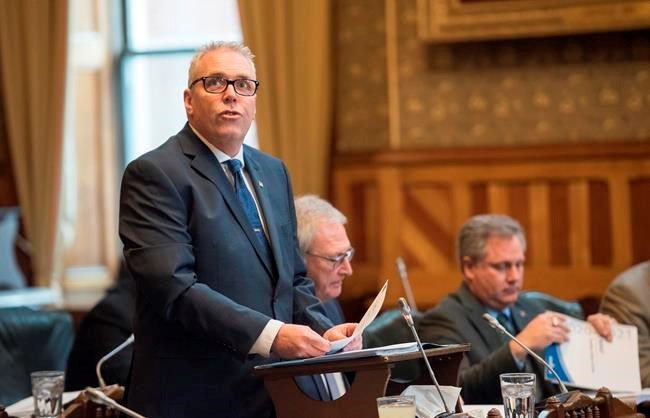FREDERICTON — New Brunswick's Progressive Conservative government tabled a $10.7-billion budget Tuesday that is heavily influenced by the ongoing impact of the COVID-19 pandemic.
"While better days are ahead, we know that COVID-19 will continue to have a big influence on our lives for much of this year," Finance Minister Ernie Steeves said in the provincial legislature. "We also know that continued support will be needed."Â
The budget includes almost $65 million to directly address COVID-19 through measures such as immunization and funding for the Tele-Care 811 phone line. It also has more money for physician recruitment and new nursing homes.
The minister said addressing the pressures of the pandemic will result in a projected deficit of $244.8 million for 2021-22. Steeves is also forecasting deficits the following two fiscal years.
Steeves said it takes time to recover from an event like the pandemic.
The Canadian Taxpayers Federation criticized the news Tuesday of successive deficits. “Premier (Blaine) Higgs needs to come up with a plan to tackle these enormous deficits,” interim Atlantic director Renaud Brossard said.
Meanwhile, net debt will rise by $241 million to reach $14.1 billion — or $18,046 for every person in the province — by the end of March 2022. The net debt-to-GDP ratio for the coming year is projected to be 36.4 per cent. That metric is used to indicate a government's ability to pay back debt.
"Today's budget provides approximately $7 million across several departments to address the increasingly common struggle with mental health that New Brunswickers face," Steeves said.
The mental health spending includes $3.1 million to address an increase in complex cases, to provide improved services for children and youth and to address a need for group homes. There is also $350,000 to help address shortages of psychologists in schools, in community mental health teams and in hospitals.
Mental health services have been in the spotlight after the family of 16-year-old Lexi Daken said she waited eight hours earlier this year in a Fredericton hospital emergency department for mental health crisis care before leaving without getting any help. She died by suicide less than a week later.
"It is a shame that it took the death of this young girl to raise it to this level where we get the impression now that government is starting to move in the direction of taking it seriously," People's Alliance Leader Kris Austin said Tuesday afternoon.
Health Minister Dorothy Shephard said the Daken case didn't change the government's plans for mental health but did accelerate the schedule.
The government is not increasing so-called sin taxes on cigarettes and alcohol, but an increase in the carbon tax on April 1 is expected to hike the price of gasoline by 2.2 cents per litre and 2.6 cents per litre on diesel. Steeves said the government is looking at a number of options in an effort to offset that increase. Â
Last year, the government proposed privatizing the operation of Cannabis NB. Steeves said a decision on the future of the Crown-owned cannabis retailer will be made by cabinet on Thursday. Â
The budget includes more money to support the laptop subsidy program for students and the development of distance-learning opportunities.Â
"Mr. Speaker, these investments are largely in response to COVID-19. However, they are investments that will continue to pay dividends well into the future," Steeves said.
The Opposition Liberals had been seeking targeted investment to help tourism operators hard hit by the pandemic as well as an economic recovery plan for the province, but their finance critic, Rob McKee, said it wasn't there.
"We were looking for targeted investment in specific sectors for relief like small and medium-sized businesses, tourism, arts and culture, and there's nothing there," he told reporters.
Regarding tourism, the government is extending a rebate program for New Brunswickers who vacation within the province, something the finance minister calls a "staycation."
"This program encouraged staycations and offered New Brunswickers a 20 per cent rebate on travel expenses, resulting in more than 25,000 submissions claiming more than $17 million in expenses," Steeves said.
He said there would be other government investments in the coming year to assist small businesses and tourism operators.
The president of the Canadian Union of Public Employees in New Brunswick expressed concerns with the budget, calling it a "no-news budget" that fails to rise to the challenges posed by the pandemic.
"Sadly, the measures miss the target and fail to invest in people first, where we get the biggest bang for our bucks,” Brien Watson said.
This report by The Canadian Press was first published March 16, 2021.
Kevin Bissett, The Canadian Press




